| Srl | Item |
| 1 |
ID:
169288
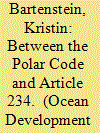

|
|
|
|
|
| Summary/Abstract |
In January 2017, the Polar Code entered into force and prompted the adoption, in Canada, of the Arctic Shipping Safety and Pollution Prevention Regulations (ASSPPR). The latter incorporate the Polar Code with a view to maintaining or increasing the preexisting level of protection. Consequently, a balancing act plays out in the ASSPPR, which are partly based on the Polar Code and partly on an alternative jurisdictional basis, arguably Article 234 of the United Nations Convention on the Law of the Sea. The objective of this article is to map out and put into historic perspective the balance chosen by Canada in the ASSPPR.
|
|
|
|
|
|
|
|
|
|
|
|
|
|
|
|
| 2 |
ID:
188220
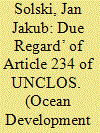

|
|
|
|
|
| Summary/Abstract |
Article 234 of UNCLOS is in many ways exceptional, but it is not unique in the sense that it grants to the coastal state “complete” legislative power. Arguably, “complete” coastal state jurisdiction exists in the territorial sea for the purposes enumerated in Article 21(1), allowing coastal states to adopt ship reporting systems, pilotage, and other routing measures unilaterally. The analysis of state practice reveals that states often decide to engage the International Maritime Organization (IMO) in different ways, even when such a course of action is not mandatory. This article advocates for meaningful deliberation as both a suitable method of meeting Article 234’s due regard standard, and a practice that can be expected from a steward.
|
|
|
|
|
|
|
|
|
|
|
|
|
|
|
|
| 3 |
ID:
178618
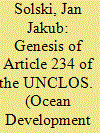

|
|
|
|
|
| Summary/Abstract |
Article 234 is exceptional regarding its wording and placement in the United Nations Convention on the Law of the Sea (UNCLOS), as well as in its historical background. The Arctic provision has given rise to divergent interpretations regarding the conditions for invoking it, the limitations on the authority under Article 234, and its spatial scope of application. It has served as a justification for specific legislation adopted by Canada and Russia that has been opposed by the United States. The article, describes as a “textbook example of finding a compromise in international treaty negotiations,” was negotiated directly and privately, among these three states during the Third United Nations Conference on the Law of the Sea (UNCLOS III). This article describes the historical background to Article 234 and sheds new light on the negotiating process that led to the adoption of the provision.
|
|
|
|
|
|
|
|
|
|
|
|
|
|
|
|
| 4 |
ID:
133953


|
|
|
|
|
| Publication |
2014.
|
| Summary/Abstract |
This article recounts the negotiations and emergence of Article 234 concerning ice-covered areas in the UN Convention on the Law of the Sea. As Arctic shipping increases, more vessels and flag states may be subject to the provisions of Article 234, which permit coastal states to both prescribe and enforce special measures to protect the marine environment in ice-covered areas. The history of the Article 234, disclosed partially through declassified U.S. government documents, provides context for implementation of the provision by Arctic coastal states and flag states.
|
|
|
|
|
|
|
|
|
|
|
|
|
|
|
|
| 5 |
ID:
152769
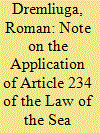

|
|
|
|
|
| Summary/Abstract |
This note explores the nature of Article 234 of the 1982 UN Convention on the Law of the Sea in light of decreasing Arctic ice cover. Despite various readings and possible interpretations of Article 234, the principal source of the rules of treaty interpretation is the 1969 Vienna Convention on the Law of Treaties. The note concludes, based on treaty interpretation, that there are no legal grounds for changing the Arctic regime based on Article 234 in light of the decreasing ice cover in the Arctic.
|
|
|
|
|
|
|
|
|
|
|
|
|
|
|
|
| 6 |
ID:
160925
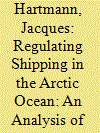

|
|
|
|
|
| Summary/Abstract |
The United Nations Convention on the Law of the Sea (LOSC) permits state parties to establish an Exclusive Economic Zone (EEZ) 200 nautical miles from their coast. Coastal states have exclusive jurisdiction over resources within the EEZ, but navigational and other high seas freedoms continue to exist. A significant number of states have, however, enacted legislation that departs from the LOSC, interfering with the navigational rights and freedoms of other states. This article analzses this development with a specific focus on the Arctic. It investigates the powers of Arctic coastal states to regulate shipping in the EEZ and thereby navigation in the Arctic Ocean. It adds to the existing literature by providing an analysis of state practice, suggesting that despite uncertainty concerning the interpretation of the LOSC Article 234 and the right to exercise legislative jurisdiction over ice-covered waters, a not insignificant number of states have claimed jurisdiction in their own EEZ beyond the rights granted in the LOSC, and are therefore not in a position to object to extensive jurisdictional claims in the Arctic.
|
|
|
|
|
|
|
|
|
|
|
|
|
|
|
|